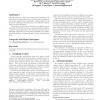Free Online Productivity Tools
i2Speak
i2Symbol
i2OCR
iTex2Img
iWeb2Print
iWeb2Shot
i2Type
iPdf2Split
iPdf2Merge
i2Bopomofo
i2Arabic
i2Style
i2Image
i2PDF
iLatex2Rtf
Sci2ools
105
Voted
SAC
2010
ACM
2010
ACM
Sporadic Server revisited
The Sporadic Server (SS) overcomes the major limitations of other Resource Reservation Fixed Priority based techniques, but it also presents some drawbacks, mainly related to an increased scheduling overhead and a not so efficient behavior during overrun situations. In this paper we introduce and prove the effectiveness of an improved SS with reduced overhead and fairer handling of server overrun situations. We also show how this can be efficiently exploited to provide temporal isolation in a multiprocessor platform, adapting already existing schedulability tests. Categories and Subject Descriptors D.4.1 [Operating Systems]: Process Management Keywords Scheduling, Fixed Priority, Multiprocessor, Sporadic Server, Overruns
| Added | 17 May 2010 |
| Updated | 17 May 2010 |
| Type | Conference |
| Year | 2010 |
| Where | SAC |
| Authors | Dario Faggioli, Marko Bertogna, Fabio Checconi |
Comments (0)

